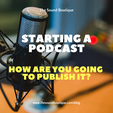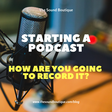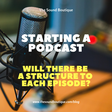Starting a podcast: how are you going to publish it? Happy Friday one and all. I hope you've had a good week. This is the last post in this Starting A Podcast series, so I hope that you've found some of what I've written useful. When a podcast is commissioned the finished episodes are published on the broadcaster's platform, like BBC Sounds etc. If, however, you are publishing your podcast yourself there's an almost overwhelming amount of choice of podcast hosts, with everything from free to expensively priced tiers. Once you've decided on your podcast provider, it doesn't stop there. Most podcast hosts will push your podcast episodes out to other providers, but it's worth checking that they do, and if not, set them up yourself using your podcast's RSS feed url. It's really not an exact science, and with Apple still the largest provider by far, you'll want to make sure it's been accepted by them. This means following their guidelines for artwork, quality and ratings even before you've published an episode. The benefit to Apple accepting your podcast is that the Google gremlins will pick up your podcast from there really easily, making it more discoverable. Anyway, back to the podcast provider. This is the centre of your podcast universe. Here you'll be able to upload episodes with artwork and show notes (make sure you include links to your website!), and examine the stats once you're up and running. I've been using Buzzsprout for a little while now so I can recommend that, but it would be definitely worth a search online for podcast host comparisons. A little tip here: choose a day and time to publish your podcast and stick to it. It doesn't matter too much if it's on Monday at 10am or Friday at 10pm, just be consistent. Your audience will expect it at least on a certain day of the week and will happily hit the unsubscribe button if you're being inconsistent. If you have any questions or comments about anything mentioned in the Starting A Podcast blog series, I'd be happy to talk. Have a great weekend and happy podcasting! Starting a podcast: how are you going to record it? There are definitely different approaches here, and I feel it depends on who you are and what you want the feel of your show to be. By the way, I'm not going to simply recommend microphones and software here, this is more about techniques you can use regardless of how you record. My whole career is based around making sounds sound good. I'm a composer for TV and I offer podcast production (editing dialogue, treating audio etc) and audio branding services. Production quality is high on my list of priorities, because if it wasn't I feel it would have a knock on effect to those other areas. That's not to say that my approach is right for you. If you simply have a great idea and want to get started, you have a voice recorder in your pocket. Nowadays, smart phones have pretty good microphones, and there are free apps to record with and free apps to edit with (mental note: that's a whole other blog post for the future). Some podcast hosts even offer recording via their apps so you can record and publish seamlessly. I'm not sure if I've said this for a few posts, so I'll say it again: IT'S ALL ABOUT THE CONTENT. Listeners can be forgiving of lower production quality if your idea is good and well executed. That said, if you want to go the extra mile, it's only going to improve your prospects. My first little tip is about echo. Whatever you are recording on, whether it's your phone or the most expensive microphone ever built, if you record in a really echoey room it's going to be off-putting. Look around the place you want to record, are there lots of shiny surfaces? These surfaces are the nemesis of recording dialogue as sound reflects. If you have fewer shiny surfaces the chance of sound bouncing around and creating echo is reduced, simple! True story: I had a guest on Creative Cuppa recently. When she popped up on the screen she was in her wardrobe, surrounded by hanging clothes. She recorded on her hand held recorder and emailed her side of the chat to me afterwards, and it sounded AMAZING. My other tip is about guests or co-hosts. We're currently in a situation where recording in the same room isn't an option, so remote recording is the way to go. There are lots of ways to do this. One way is to record everyone involved over the internet, through whatever video conferencing programme you use (Zoom is able to record each person separately which is a bonus), and there are professional remote recording websites (at professional prices) for those who really want to go the extra mile. The only downside to this approach is that you are entirely at the mercy not only of your internet connection but of your co-hosts' and guests' connections too. I much prefer remote guests to record themselves. I talk through how with them beforehand, and generally if they don't have podcasting equipment, recording on their phone and sending it afterwards works just fine. I could go on about recording techniques all day long, but if you do your best to eliminate that echo, it'll make everything else a little easier. If you have any questions about this or any other post in the 'Starting A Podcast' series, feel free to contact me. Until next time, have a very happy Friday and a great weekend. Gareth Starting a podcast: will there be a structure to each episode? I previously mentioned that the simpler the idea, the better. If you listen to Creative Cuppa, it might sound like relaxed chats with creative people over a nice cuppa (that's the simple idea), but it's taken a lot of work to make it sound that simple. I decided before I started what the format was going to be: no longer than 15 minutes; audio ident --> theme music --> intro --> chat --> links --> outro. The 'chat' itself is researched. I don't give the guests a full set of questions, but before we hit record I'll run through the signposts I've come up with, the areas to chat around. It's not meant to be a formal interview, and I have to be prepared to let the conversation be flexible. Because, well, that's what a chat is. But here's the thing: the 'chat' part of the podcast is the only flexible part. It's surrounded by the structure, the walls that make the show recognisable. Why? Because whether we like it or not, we just love routine. Routine is what gives a podcast the 'comfort blanket' feeling. You're discovering new things in safe surroundings. So long as you decide what your format will be and stick to it, i.e. you are consistent, you'll find your show will become its own thing very quickly and people will begin to be drawn to it. If you have any questions about formats or any of the questions raised in this blog series, feel free to reach out. For now, have a very happy Friday and a fabulous weekend. Gareth |
Details
AuthorPosts by Gareth Davies. Archives
November 2020
Categories
All
|
© 2024 The Sound Boutique Limited. All rights reserved.
Registered address: 11/12 Hallmark Trading Centre, Fourth Way, Wembley, Middlesex, United Kingdom, HA9 0LB.
Registered address: 11/12 Hallmark Trading Centre, Fourth Way, Wembley, Middlesex, United Kingdom, HA9 0LB.

 RSS Feed
RSS Feed